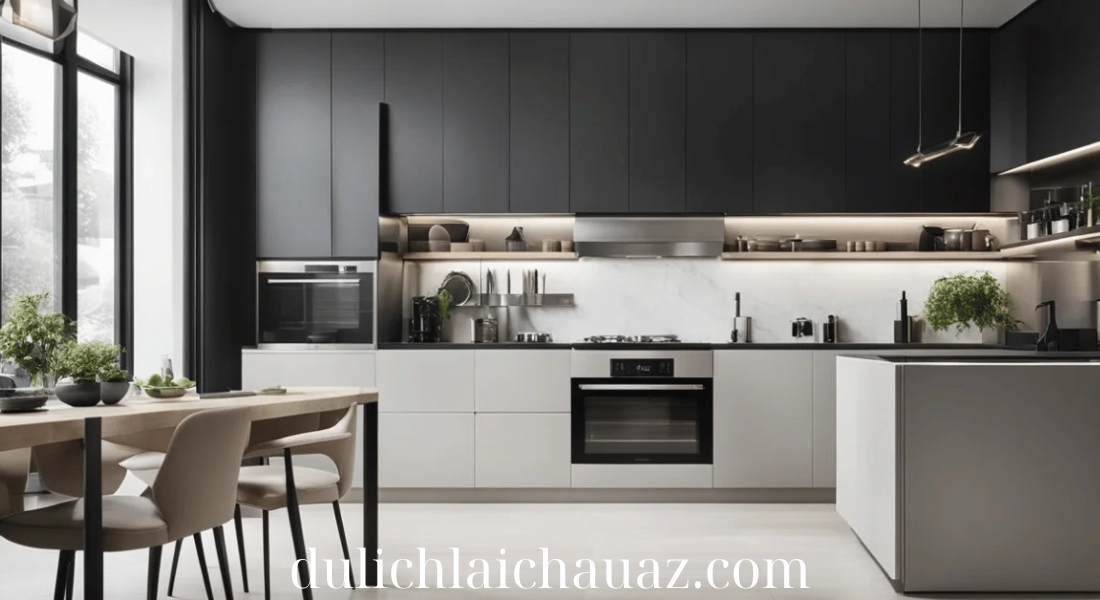Minimalist Kitchen Design: Embracing Simplicity and Functionality
Minimalist kitchen design is a contemporary approach that emphasizes simplicity, functionality, and clean lines. This design philosophy seeks to eliminate clutter and distractions, allowing the beauty of the space and its essential elements to shine. Minimalism is not just about reducing the number of items; it’s about creating a harmonious environment that promotes efficiency and calm. In this comprehensive guide, we will explore the key elements of minimalist kitchen design, share inspiring ideas, and provide practical tips to help you create a sleek and functional kitchen that embodies the principles of minimalism.
Key Elements of Minimalist Kitchen Design
To achieve the serene and uncluttered look of a minimalist kitchen, it’s essential to incorporate several defining elements that characterize this design style.
1. Neutral Color Palette
A hallmark of minimalist kitchen design is the use of a neutral color palette. Whites, grays, and muted tones create a clean backdrop, promoting a sense of tranquility. This simplicity allows for easy integration of various materials and textures while keeping the overall aesthetic cohesive. You can also incorporate subtle accent colors sparingly to add depth without overwhelming the space.
2. Sleek Cabinetry
Minimalist kitchens typically feature sleek, flat-panel cabinetry without ornate details or hardware. Handleless designs or push-to-open mechanisms create a seamless look, enhancing the kitchen’s clean lines. Opt for high-quality materials such as lacquered finishes or wood veneer to maintain a sophisticated appearance.
3. Open Layout
An open layout is fundamental to minimalist design. It promotes flow and connectivity between the kitchen and adjacent living spaces. This layout creates an airy atmosphere and allows for easy movement, making the kitchen feel more spacious. Consider incorporating a central island that doubles as a prep area and a casual dining space.
4. Functional Appliances
In a minimalist kitchen, appliances are chosen for their functionality and sleek design. Built-in appliances can help maintain clean lines and reduce visual clutter. Look for appliances that blend seamlessly into the cabinetry, ensuring that they are both practical and aesthetically pleasing.
5. Smart Storage Solutions
Efficient storage is essential in minimalist design to keep surfaces clear and organized. Use pull-out shelves, drawer organizers, and hidden cabinets to maximize storage without cluttering the space. Consider vertical storage options, such as wall-mounted shelves, to keep countertops free of unnecessary items.
6. Minimal Accessories
In a minimalist kitchen, less is more when it comes to accessories. Choose a few carefully selected decorative items that enhance the overall design without overwhelming the space. Opt for functional decor, such as stylish cutting boards or elegant cookware, that can be displayed without detracting from the minimalist aesthetic.
7. Natural Light
Natural light plays a crucial role in minimalist kitchen design. Large windows, skylights, or glass doors can flood the space with light, creating an inviting atmosphere. Consider using sheer window treatments to allow for privacy while still maximizing light.
8. Textural Variety
While minimalist design emphasizes simplicity, incorporating a variety of textures can add depth and interest to the space. Mix materials such as wood, stone, and metal to create a warm and inviting environment. For instance, pairing a smooth stone countertop with a wooden dining table can enhance the overall aesthetic without compromising minimalism.
Inspiring Minimalist Kitchen Design Ideas
Here are some creative minimalist kitchen design ideas to help you bring this stylish aesthetic into your home:
1. Monochromatic Schemes
Opt for a monochromatic color scheme using varying shades of white or gray. This creates a cohesive look and enhances the sense of space. Consider using different textures, such as a matte finish on the cabinets and a glossy countertop, to add subtle contrast.
2. Integrated Appliances
Choose integrated appliances that blend seamlessly with your cabinetry. This can include refrigerators, dishwashers, and ovens that are hidden behind cabinetry panels, creating a streamlined look that enhances the minimalist aesthetic.
3. Statement Lighting
Incorporate statement lighting fixtures that reflect the minimalist style. Pendant lights or sculptural ceiling fixtures can serve as focal points without overwhelming the design. Choose lighting that complements the overall aesthetic and provides functional illumination for work areas.
4. Open Shelving
Consider using open shelving to display a curated selection of dishes or cookbooks. This keeps essential items within reach while maintaining an open feel. Use consistent colors and materials for the displayed items to ensure a cohesive look.
5. Simple Backsplashes
Choose simple backsplash materials, such as subway tiles or natural stone, to enhance the minimalist aesthetic. A clean, unembellished backsplash can serve as a subtle backdrop that complements the overall design without drawing too much attention.
6. Seamless Countertops
Opt for seamless countertops made from materials like quartz or solid surface. These materials provide a sleek, uninterrupted look that enhances the minimalist design. Consider an integrated sink for a more cohesive appearance.
7. Functional Furniture
Incorporate functional furniture that serves multiple purposes. A dining table that doubles as a prep area or a bench with hidden storage can help maintain an organized space while providing essential functionality.
8. Greenery and Natural Elements
Add a touch of greenery through plants or herbs to bring life to your minimalist kitchen. Choose low-maintenance plants that thrive indoors, such as succulents or herbs in stylish pots. These elements can enhance the aesthetic without introducing clutter.
Practical Tips for Achieving the Perfect Minimalist Kitchen Design
- Choose Quality Over Quantity: Invest in high-quality materials and appliances that enhance the functionality and aesthetic of your kitchen. This ensures durability and reduces the need for frequent replacements.
- Declutter Regularly: Regularly declutter your kitchen to maintain a clean and organized space. Assess what items you truly need and eliminate anything that doesn’t serve a purpose.
- Embrace Simplicity: Focus on simplicity in your design choices. Choose straightforward shapes and lines, avoiding overly ornate details that can distract from the minimalist aesthetic.
- Maximize Natural Light: Use window treatments that allow for maximum natural light while providing privacy. This can help create a bright and airy atmosphere in your kitchen.
- Plan for Functionality: Ensure your kitchen layout promotes functionality and ease of movement. Consider how you use the space daily and design with efficiency in mind.
- Incorporate Technology Thoughtfully: Integrate smart home technology and appliances that enhance the kitchen’s functionality without compromising the minimalist design.
Conclusion
Minimalist kitchen design is a stylish and functional approach that embraces simplicity, efficiency, and clean lines. By incorporating key elements such as neutral color palettes, sleek cabinetry, efficient storage solutions, and smart appliances, you can create a serene kitchen environment that promotes calm and focus. Whether you are renovating your existing kitchen or designing a new space, these minimalist kitchen design ideas will inspire you to craft a kitchen that embodies the principles of minimalism while providing a warm and inviting atmosphere. Embrace the beauty of simplicity, and transform your kitchen into a peaceful haven for cooking, dining, and gathering with loved ones. With thoughtful planning and a focus on functionality, your minimalist kitchen can become a stylish and efficient heart of your home.














Post Comment